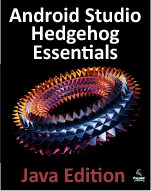Difference between revisions of "Android Studio Development Essentials - Java Edition"
From Techotopia
| Line 101: | Line 101: | ||
# [[An Overview of Gradle in Android Studio]]<br><br> | # [[An Overview of Gradle in Android Studio]]<br><br> | ||
| + | |||
| + | == New Chapters == | ||
| + | |||
| + | # [[An Overview of Android Dynamic Feature Modules]] | ||
<htmlet>androidstudio32</htmlet> | <htmlet>androidstudio32</htmlet> | ||
Revision as of 19:39, 6 May 2019
| Table of Contents | Next | |
| Introduction |
Table of Contents
- Introduction
- Android Studio Installation and Setup
- Creating an Example Java Android App in Android Studio
- Creating an Android Virtual Device (AVD) in Android Studio
- Using and Configuring the Android Studio AVD Emulator
- A Tour of the Android Studio User Interface
- Testing Android Studio Apps on a Physical Android Device
- The Basics of the Android Studio Code Editor
- An Overview of the Android Architecture
- The Anatomy of an Android Application
- Understanding Android Application and Activity Lifecycles
- Handling Android Activity State Changes
- Android Activity State Changes by Example
- Saving and Restoring the State of an Android Activity
- Understanding Android Views, View Groups and Layouts
- A Guide to the Android Studio Layout Editor Tool
- A Guide to the Android ConstraintLayout
- A Guide to using ConstraintLayout in Android Studio
- Working with ConstraintLayout Chains and Ratios in Android Studio
- An Android Studio Layout Editor ConstraintLayout Tutorial
- Manual XML Layout Design in Android Studio
- Managing Constraints using Constraint Sets
- A Guide to using Instant Run in Android Studio
- An Overview and Example of Android Event Handling
- Android Touch and Multi-touch Event Handling
- Detecting Common Gestures using the Android Gesture Detector Class
- Implementing Custom Gesture and Pinch Recognition on Android
- An Introduction to Android Fragments
- Using Fragments in Android Studio - An Example
- Modern Android App Architecture with Jetpack
- An Android Jetpack ViewModel Tutorial
- An Android Jetpack LiveData Tutorial
- An Overview of Android Jetpack Data Binding
- An Android Jetpack Data Binding Tutorial
- Working with Android Jetpack Lifecycle-Aware Components
- An Android Jetpack Lifecycle Tutorial
- An Overview of the Android Jetpack Navigation Architecture Component
- An Android Navigation Component Tutorial
- Creating and Managing Overflow Menus on Android
- Animating User Interfaces with the Android Transitions Framework
- An Android Transition Tutorial using beginDelayedTransition
- Implementing Android Scene Transitions – A Tutorial
- Working with the Floating Action Button and Snackbar
- Creating a Tabbed Interface using the Android TabLayout Component
- Working with the RecyclerView and CardView Widgets
- An Android RecyclerView and CardView Tutorial
- An Android Layout Editor Sample Data Tutorial
- Working with the Android AppBar and Collapsing Toolbar Layouts
- Implementing an Android Navigation Drawer
- An Android Studio Master/Detail Flow Tutorial
- An Overview of Android Intents
- Android Explicit Intents – A Worked Example
- Android Implicit Intents – A Worked Example
- Android Broadcast Intents and Broadcast Receivers
- A Basic Overview of Threads and AsyncTasks
- An Overview of Android Started and Bound Services
- Implementing an Android Started Service – A Worked Example
- Android Local Bound Services – A Worked Example
- Android Remote Bound Services – A Worked Example
- An Android Notifications Tutorial
- An Android Direct Reply Notification Tutorial
- An Introduction to Android Multi-Window Support
- An Android Studio Multi-Window Split-Screen and Freeform Tutorial
- An Overview of Android SQLite Databases
- The Android Room Persistence Library
- An Android TableLayout and TableRow Tutorial
- An Android Room Database and Repository Tutorial
- Accessing Cloud Storage using the Android Storage Access Framework
- An Android Storage Access Framework Example
- Implementing Video Playback on Android using the VideoView and MediaController Classes
- Android Picture-in-Picture Mode
- An Android Picture-in-Picture Tutorial
- Video Recording and Image Capture on Android using Camera Intents
- Making Runtime Permission Requests in Android
- Android Audio Recording and Playback using MediaPlayer and MediaRecorder
- Working with the Google Maps Android API in Android Studio
- Printing with the Android Printing Framework
- An Android HTML and Web Content Printing Example
- A Guide to Android Custom Document Printing
- An Introduction to Android App Links
- An Android Studio App Links Tutorial
- An Introduction to Android Instant Apps
- An Android Instant App Tutorial
- Adapting an Android Studio Project for Instants Apps
- A Guide to the Android Studio Profiler
- An Android Biometric Authentication Tutorial
- Creating, Testing and Uploading an Android App Bundle
- An Overview of Gradle in Android Studio
New Chapters
| Table of Contents | Next | |
| Introduction |





